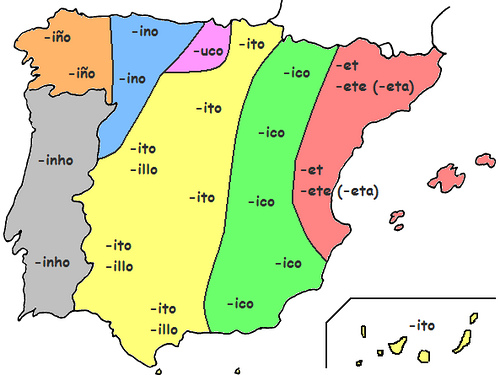 |
Majo→majete - Sufijos apreciativos |
As well as denoting size or degree, the augmentative and diminutive suffixes tend to convey a range of subtle (or not so subtle) subjective value judgments. These are known as sufijos apreciativos.
The image below, showing the distribution of the main diminutives throughout Spain, illustrates the regional differences in use. See the NGLE for an exhaustive explanation.
In this article we discuss the most widely used diminutive forms in Spain.
Remember, while use of these suffixes is not so common in written Spanish, they are used continually in informal spoken communication.

Diminutives
1. The diminutives are used to convey a slighter degree of the word's root meaning, to convey the smallness of the object or quality named, or to convey a sense of intimacy or endearment. Much of their meaning is dependent on the context and even the tone of the speaker. For example, being small, in itself, is neither pejorative nor complimentary; yet if it refers to a man's penis, to use a vulgar example, it tends to take on negative connotations.
The two most common diminutive suffixes are -ito and -illo.1
-Una cosa → Una cosita /cosilla [Referring to smaller size or importance]
-La mujer → La mujercita [Nice little lady/wife; small, young, endearing]
-Un hombre → Un hombrecillo [A little man; possibly pejorative = weak, unmanly, cowardly]
-Abogado → Abogadito [Probably pejorative; belittling the person's ability or importance as a lawyer]
-Un político → Un politiquillo [Minor or unimportant; second-rate]
-Un español → Un españolito [Young, small, or unimportant]-Bragas → Braguitas [More delicate, but also less direct and awkward by attenuating; familiar]
-Calor→ Calorcito /calorcillo [Warmth; pleasant heat; appreciative]
2. Through time, some of these nouns have taken on a meaning of their own, and they appear in the dictionary. In these cases, the noun tends to lose any possible subjective connotations.
-Una mesa → Una mesita /mesilla[Night-stand; not just a small table; it has its own function]
-Paño → Pañuelo (Handkerchief; not just a small cloth]
-Una central → Una centralita [Switchboard; not just a small telephone exchange]
-Cigarro → Cigarrillo [Cigar/Cigarette→ Cigarette]
-Cuaderno → Cuadernillo [Notebook→ Booklet]
-Mano → Manilla/Manecilla [Hand→ Clock hand/pointer/handle]
3. With measurements or units of time, and other countable nouns, the diminutive suffix has an attenuating effect, used to downplay the importance, significance, or quantity of something. As with most diminutives, this also gives a sensation of more familiarity.3
-Tiene 2 añitos — He's just two [He's still very small and cute]
-Quiero perder unos kilitos — I want to cut down a few kilos [Just a few kilos; it's not a big deal]
-Dame un segundito — Just give me a wee second
-Llegué media horilla tarde — I was about half an hour late [Maybe even less]
-Son cinco eurillos — That'll be (just) five euros [Only five; it's not much money]
→Me costó mil eurazos — It cost me (a whopping/whole) thousand euros [Véase sufijos aumentativos]
4. Sometimes the diminutive is actually ironic, referring to something that is in fact large or serious. In this case, it often appears in exclamations with vaya, menudo or similar.3
-¡Vaya nochecita! — What a night! [It was in fact a long or difficult night]
-Montaron una escenita — They made quite a scene
-Aún me quedan unos añitos — I've still got a few years to go [Has many years to go]
-¡Menudo viajecito! — What a trip! [It may have been a long or problematic trip]
-Telita con la niña aquella — That girl is something else [See vaya tela]
5. Used with qualitative adjectives, it tends to mean 'quite' or 'pretty'; i.e. it can mean 'a lot / to a large extent', or it can mean 'to a limited degree'. It also adds a subjective feel to it, a bit like using 'nice and+adjective' in English. The tone of the speaker and context will usually clarify which meaning is intended.4
-Está grandecito —He's pretty big [Bigger than expected or not quite as big as he could be]
-Me dio una explicación cortita —He gave me a nice and short explanation [Short to a pleasing extent]
-Se está calentito aquí — It's nice and warm here [Comfortably warm or pretty warm]
-La tienda está cerquita — The shop is pretty close [Nice and close; conveniently close]
-Eso es, acércate... despacito — That's it, move towards me... nice and slow [Slow to a pleasing extent]
-Su hija es guapita — Her daughter is not bad-looking [She's pretty, but not that pretty]
-Este jamón serrano está durito — This serrano ham is a bit tough [Attenuating]
-Son crujientes por fuera y cremositas por dentro — They're crunchy on the outside and nice and creamy on the inside
With the adjectives/adverbs solo, mismo and igual, the diminutive is used to intensify the quality, like saying exactamente, justamente or completamente.3
-Me vas a dejar solito — You're going to leave me all alone
-Juan se ha metido en este lío él solito — Juan has got himself into this mess all by himself
-Es igualito a su hermano — He's just like his brother/the spitting image of his brother
-Mira. Lo ha hecho igualito que tú — Look. He's done it exactly like you
-Déjalo ahí mismito — Leave it right there
-Está ubicado en el mismito polígono — It's located in the very industrial estate itself
6. The suffix -ete/eta, meanwhile, is harder to translate. Rather than the degree or size, it tends to denote irony, disparagement, or attenuation.4
"-ete: Sufijo usado para formar diminutivos, despectivos u otras palabras de valor afectivo, a veces de manera no muy explícita, a partir de adjetivos y sustantivos".
"Forma este sufijo aún más que -illo nombres de significado peculiar y se aplica acomodaticiamente para designar por semejanza del que lleva propiamente el nombre originario".4
Sus amiguetes — His buddies (Superficial friends; they seem like friends but they may not be real friends)
Vejete/viejete — Old codger/old boy (Pejorative; stereotypically old person, in appearance and attitude)
Regordete — Chubby (Fat but in a nice kind of way; fattish)
Galancete — Young lead actor (Inexperienced; handsome but not as gallant as he would like to believe)
Es majete — He's a nice-enough guy (quite a nice guy; he seems nice enough, but you wouldn't say he is really nice)
El graciosete (graciosillo) — The funny guy (smartass) [Someone who thinks he is, or tries to be, funny or is typically funny, although people might not actually find them that funny]
See also: sufijos aumentativos, sufijo -ucho & sufijo -ín
![]() Ejercicios | Ponte a prueba
Ejercicios | Ponte a prueba
This content is only available to subscribers. Please log in or sign up free to use all the features. (Existing members, go to Mi Cuenta to upgrade)
In Español-Avanzado Articles
˜
-sufijos apreciativos -ito/-illo y -ete-

